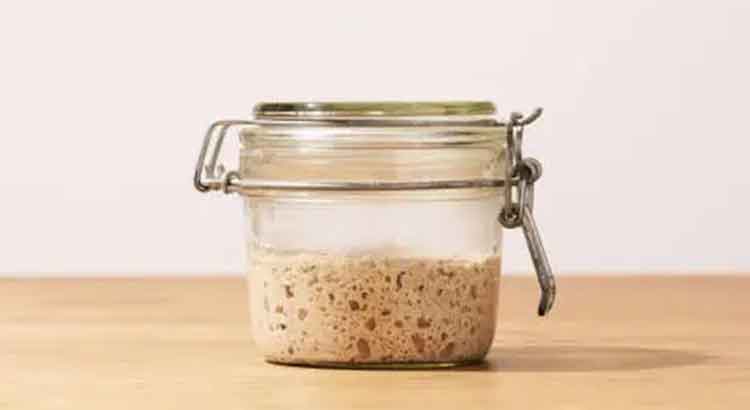Do you ever find yourself in the kitchen, craving the tangy goodness of homemade sourdough bread? Wondering what flour to use for that perfect sourdough starter? Look no further!
The best flour to make a sourdough starter is whole wheat flour. Its natural nutrients and robust flavor kickstart the fermentation process, giving your sourdough that signature tang. But wait, there’s more! We’ve got seven flour types lined up for you, each with its unique twist on sourdough magic.
From the secrets of rye to the allure of all-purpose flour, we’re here to unravel the mystery of the perfect sourdough starter. Get ready to embark on a delicious journey, where each flour type brings its character to the table. So, whether you’re a seasoned baker or just dipping your dough into sourdough, we’ve got the flour wisdom you need to create that bubbly, flavorful starter you’ve been dreaming of.
All-Purpose Flour
If you’re looking for versatility in your sourdough starter, all-purpose flour is your go-to. It’s like the Swiss Army knife of flours – reliable and adaptable. All-purpose flour strikes a balance between protein content and starch, making it suitable for various baking endeavors.
This flour is readily available and wallet-friendly, making it an excellent choice for beginners. Its moderate protein content allows your starter to develop a robust structure, resulting in a pleasantly chewy crumb and a slightly tangy flavor profile. So, if you have all-purpose flour sitting in your pantry, don’t hesitate to use it to kickstart your sourdough adventure.
(I usually use the 365 Amazon Brand Flour, due to the accessible price, but I also had great results with King Arthur Flour)
Bread Flour
When you’re aiming for that perfect chew and a lofty rise in your sourdough, bread flour is your trusty sidekick. With a higher protein content than all-purpose flour, it provides more strength and structure to your starter, resulting in a well-developed gluten network.
The added gluten strength gives your sourdough bread that coveted rise, creating a lighter and airier crumb. So, if you crave a hearty, chewy texture in your sourdough loaves, look no further than bread flour. It’s the flour of choice for many sourdough enthusiasts who want to achieve that classic bakery-style bread at home.
Whole Wheat Flour
Whole wheat flour is like the health-conscious friend in your flour collection. It contains the bran and germ of the wheat kernel, which means it’s packed with nutrients and fiber. When used in your sourdough starter, it adds depth and complexity to the flavor.
This flour type may require a bit more attention due to its lower gluten content compared to all-purpose or bread flour. However, the trade-off is a distinctive nutty flavor and a denser, heartier texture in your sourdough bread. If you’re a fan of that rustic, whole-grain goodness, whole wheat flour is your best bet.
Rye Flour
If you’re in search of a sourdough starter with a bold personality, rye flour is the answer. Rye flour is renowned for its unique flavor profile, characterized by a deep, earthy tang that sets it apart from the rest.
Rye flour has less gluten than wheat flours, making it an excellent choice for those looking for a dense and chewy sourdough bread. It also ferments quickly, so your sourdough starter will be bubbling away in no time. The rich flavor and distinctive texture it imparts to your bread will make your taste buds dance with delight. So, if you’re feeling adventurous and want to explore the world of bold sourdough flavors, give rye flour a try.
Spelt Flour
Spelt flour is the ancient grain that’s making a modern comeback. With its mild, nutty flavor and lower gluten content than wheat flours, it’s a fantastic choice for those seeking an alternative to traditional sourdough flours.
Using spelt flour in your sourdough starter results in a bread that’s slightly denser but incredibly flavorful. Its distinct taste adds a touch of sophistication to your loaves, and it’s well-suited for those with mild gluten sensitivities. Spelt flour’s unique characteristics make it a favorite among sourdough enthusiasts who appreciate a bit of diversity in their bread-baking adventures.
Einkorn Flour
Einkorn flour, one of the oldest cultivated grains, offers a glimpse into the past while creating a delightful sourdough experience. With its sweet and mild flavor, einkorn flour is a hidden gem among sourdough enthusiasts.
This flour has a lower gluten content compared to modern wheat, making it easier to digest for some individuals. Using einkorn flour in your sourdough starter results in a bread that’s tender, with a pleasingly chewy texture. It’s an excellent choice for those looking for a unique, ancient grain twist in their sourdough journey. So, if you’re curious about stepping back in time and savoring the flavors of yesteryears, einkorn flour is your ticket to a delightful sourdough adventure.
Barley Flour
Barley flour is a unique addition to the world of sourdough, offering a distinctive flavor profile and texture. When used in your sourdough starter, barley flour contributes a nutty and slightly sweet taste that sets it apart from other grains.
While barley flour has less gluten than wheat flours, it can still provide structure to your sourdough bread, albeit with a denser crumb. Its flavor pairs well with various ingredients, making it a versatile choice for those looking to experiment with different sourdough recipes.
Additionally, barley flour contains essential nutrients, making your sourdough bread not only delicious but also nutritious. If you’re seeking a flour that adds a unique twist to your sourdough and a hint of wholesome goodness, barley flour is worth trying in your next baking venture. It’s an opportunity to infuse your sourdough with a touch of distinct barley charm, creating loaves that stand out from the crowd.
Final Thoughts
As we’ve explored these seven flour types for making a sourdough starter, it’s evident that each brings its own personality to the world of bread baking. The choice of flour is not just about texture; it’s about flavor, nutrition, and the kind of sourdough experience you desire.
If you’re new to sourdough or prefer a versatile option, all-purpose flour is a great starting point. It’s easy to work with and can yield excellent results.
For those aiming for that classic bakery-style bread with a chewy texture, bread flour is the dependable choice. Its higher protein content ensures a lofty rise and a satisfying crumb.
Whole wheat flour introduces a wholesome, nutty depth to your sourdough, while rye flour offers a bold and earthy tang that’s sure to please adventurous palates.
If you’re curious about ancient grains, spelt flour and einkorn flour provide unique flavors and alternative options for those with sensitivities.
Lastly, barley flour adds a sweet, nutty twist to your sourdough, along with a dose of essential nutrients.
In the world of sourdough, there’s no one-size-fits-all answer. The flour you choose will shape the flavor, texture, and overall character of your bread. So, whether you’re a novice baker or an experienced sourdough enthusiast, don’t hesitate to experiment with different flour types and discover the delightful nuances they bring to your homemade sourdough creations. Happy baking!
FAQ
Q: Can I mix different flour types in my sourdough starter?
A: Absolutely! Mixing flours can add complexity to your sourdough’s flavor. Start with one flour type and experiment by introducing others gradually. This way, you can tailor your starter to your taste preferences.
Q: How long does it take to see bubbles in my sourdough starter?
A: It usually takes 3-5 days to see consistent bubbles, but this can vary. Factors like temperature and flour type play a role. Be patient; your starter will develop at its own pace.
Q: My starter smells strange. Is it spoiled?
A: Not necessarily. During fermentation, your starter can emit various odors. If it smells like acetone or nail polish remover, it might need feeding. If it smells sour or like vinegar, it’s likely fine.
Q: Can I use gluten-free flours for a sourdough starter?
A: Yes, you can. While gluten-free flours won’t behave the same as wheat-based flours, you can create gluten-free sourdough starters. Look for dedicated gluten-free sourdough recipes and flours like rice flour or sorghum flour.
Q: Why is my sourdough bread not rising properly?
A: Several factors can affect rise. It could be due to overproofing (letting the dough rise too long), inadequate gluten development, or weak starter. Experiment with flour types, hydration levels, and fermentation times to troubleshoot.
Q: Can I switch my sourdough starter to a different flour type after it’s established?
A: Yes, you can transition your starter to a different flour type, but it may take some time for the starter to adapt to the new flour’s characteristics. Gradually introduce the new flour over a few feedings.
Q: My sourdough is too tangy. How can I make it milder?
A: To reduce sourness, try using a milder flour, like all-purpose or bread flour, instead of strong flours like rye. Additionally, shorten the fermentation time or use a smaller amount of starter in your dough.
Q: Can I use self-rising flour for sourdough?
A: It’s not recommended. Self-rising flour contains added leavening agents, like baking powder, which can interfere with the natural fermentation process of sourdough. Stick to regular flours for the best results.
Q: Is it essential to use organic flour for sourdough starters?
A: While organic flour is a good choice for sourdough, it’s not a strict requirement. The most critical factors are the type and quality of flour you use and the consistency of your feeding routine.
Q: Can I use store-bought yeast with my sourdough starter?
A: Technically, yes, but it defeats the purpose of sourdough, which relies on wild yeast and lactic acid bacteria for fermentation. Using commercial yeast will give you different results, closer to traditional bread.
Q: How can I revive a neglected sourdough starter?
A: If your starter has been neglected, it may need a few days of consistent feeding and warmth to come back to life. Gradually reintroduce fresh flour and water, discarding some of the old starter with each feeding until it becomes active again.
Q: Can I freeze my sourdough starter?
A: Yes, freezing is a viable option to preserve your starter. Just ensure it’s in an airtight container, and when you’re ready to use it again, thaw it, feed it, and let it revive.
Q: Do I need special equipment to make sourdough bread?
A: Not necessarily. While some bakers use Dutch ovens and proofing baskets, you can make excellent sourdough bread with basic kitchen tools like mixing bowls, parchment paper, and a baking sheet.
Q: What’s the best way to store sourdough bread?
A: Store sourdough in a paper bag or cloth, which helps maintain its crust’s crispiness. Avoid airtight containers, as they can make the bread soft and compromise its texture. Sourdough also freezes well.
Q: Can I share my sourdough starter with friends and family?
A: Absolutely! Sharing a piece of your active starter is a lovely way to introduce others to the joy of sourdough baking. Just ensure they follow proper feeding and care instructions.
Q: How can I adapt sourdough recipes for different flour types?
A: Experimentation is key. Adjust hydration levels, fermentation times, and mixing techniques to suit the flour you’re using. Keep notes to track your results and fine-tune your recipes over time.

